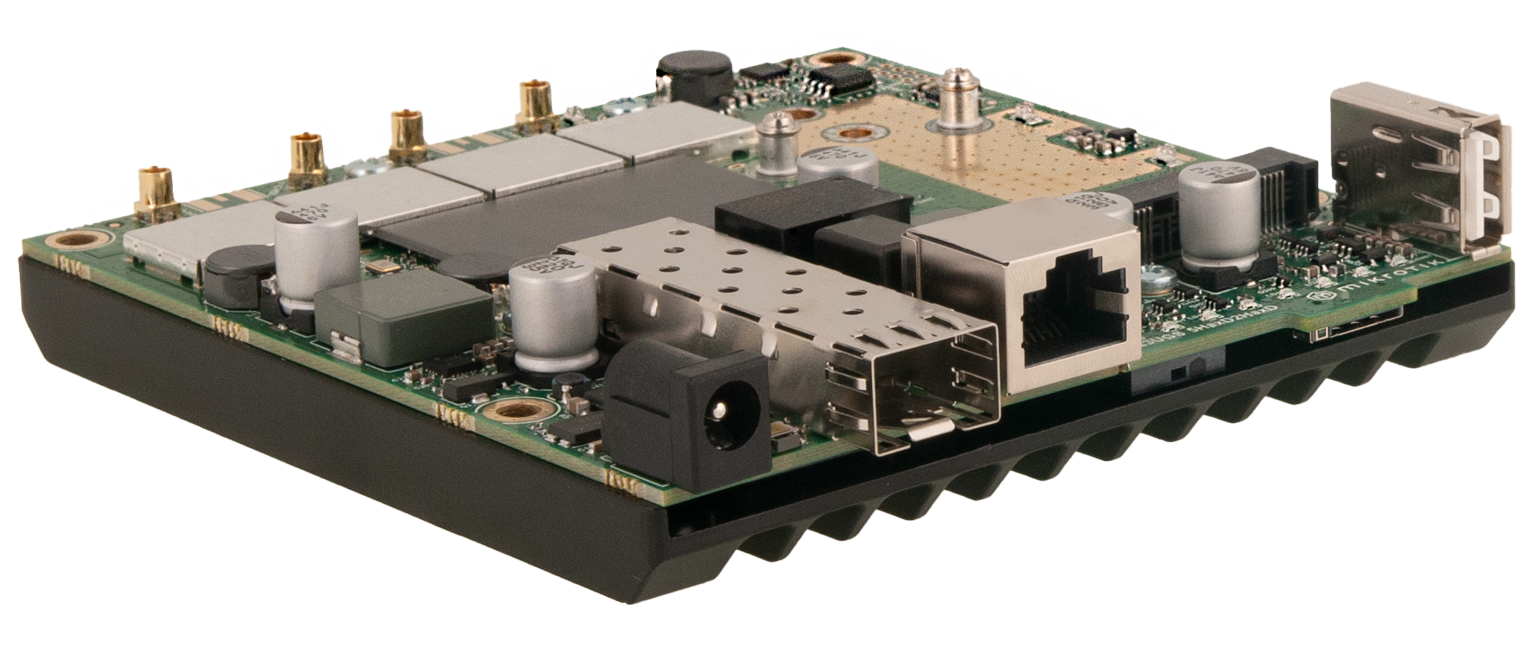-
zł
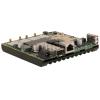
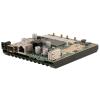
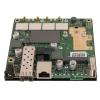
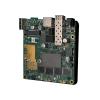
MikroTik L23UGSR-5HaxD2HaxD è un nuovo dispositivo della serie RouterBOARD dotato di Wi-Fi 6. Supporta i protocolli IEEE 802.11 b/g/n/ax nella banda a 2,4 GHz e IEEE 802.11 a/n/ac/ax nella banda a 5 GHz. Dispone di 4 connettori di tipo MMCX a cui è possibile collegare le antenne. Il design si basa su un processore dual-core ARM IPQ-5010 con clock a 800 MHz e RAM DDR3L (256 MB). Sono presenti 1 porta Gigabit Ethernet (10/100/1000 Mbps) e 1 slot SFP, che può funzionare in modalità 2,5 Gbps. La porta Ethernet funge anche da ingresso di alimentazione PoE, ma supporta solo PoE passivo, con un intervallo di tensione di 18-28 V CC. L'alimentazione può essere fornita anche tramite una presa DC classica (12 - 28 V DC).
Il dispositivo è dotato di uno slot nanoSIM e di uno slot miniPCIe a cui è possibile collegare un modulo LTE o LoRa. La porta USB 2.0 è una caratteristica aggiuntiva: in qualsiasi momento è possibile utilizzare sia la miniPCIe che la USB, ma non è possibile utilizzarne due contemporaneamente. Grazie alle caratteristiche sopra descritte, è possibile personalizzare l'L23UGSR-5HaxD2HaxD in base alle proprie esigenze. Alcune delle applicazioni principali saranno un potente router domestico con forti antenne esterne, un router LTE domestico e, utilizzando un alloggiamento esterno, un dispositivo client in reti punto-multipunto (in combinazione con un'antenna direzionale) o persino una stazione base (in combinazione con un'antenna settoriale). Nulla vieta che il prodotto offerto possa essere utilizzato come punto di accesso esterno o come parte di un altro dispositivo (ad esempio, vari tipi di distributori automatici o di biglietterie automatiche). L'L23UGSR-5HaxD2HaxD si dimostrerà valido in un'ampia gamma di applicazioni, in vari tipi di reti.

Interfaccia Wi-Fi 6
Il dispositivo è in grado di trasmettere simultaneamente reti wireless Wi-Fi 6 nelle bande 2,4 e 5 GHz e utilizza gli standard IEEE 802.11 b/g/n/ax a 2,4 GHz e IEEE 802.11 a/n/ac/ax a 5 GHz. L'utilizzo di una licenza di livello 4 consente di utilizzare l'L23UGSR-5HaxD2HaxD come punto di accesso, ad esempio come router domestico o stazione base.
Nota: i dispositivi Mikrotik con Wi-Fi Radio 6 non supportano la modalità superchannel.

Prestazioni elevate
Il prodotto offerto ha un processore ARM dual-core con clock a 800 MHz (IPQ-5010) e 256 MB di RAM. Offre prestazioni migliori rispetto ai router domestici standard e consente all'L23UGSR-5HaxD2HaxD di essere utilizzato come stazione base nelle connessioni punto-multipunto.
1 porta Gigabit Ethernet, 1 slot SFP, 1 slot miniPCIe, 1 porta USB, slot nanoSIM
La RouterBOARD è dotata di diversi tipi di interfacce. Una porta Gigabit Ethernet (10/100/1000 Mbps) e uno slot SFP sono responsabili della trasmissione principale. Inoltre, è possibile utilizzare lo slot miniPCIe, dove è possibile montare un modem LoRa o LTE. In qualsiasi momento è possibile utilizzare la porta miniPCIe o la porta USB, ma non è possibile utilizzarle entrambe contemporaneamente. Lo slot nanoSIM si trova sul telaio, mentre è possibile utilizzare modem LTE senza slot.
Questo gran numero di interfacce rende l'L23UGSR-5HaxD2HaxD una soluzione versatile che si adatta a molte reti diverse.
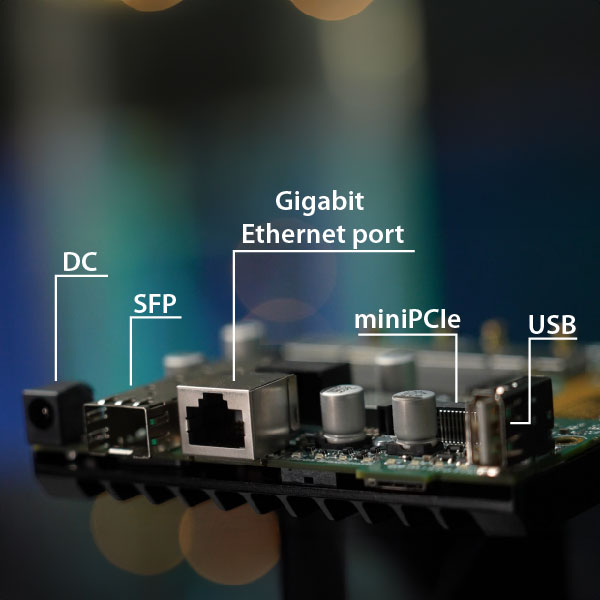

Dispositivo fai da te
L23UGSR-5HaxD2HaxD è un dispositivo fai-da-te (DIY), non ha uno chassis e deve essere personalizzato dall'utente. Una moltitudine di funzionalità, tra cui la compatibilità con i modem LoRa e LTE, rendono questa RouterBOARD adatta a numerose applicazioni.
In combinazione con un alloggiamento appropriato, può fungere da router in un laboratorio domestico, mentre utilizzandola con un'antenna direzionale o settoriale (connettori MMCX), è possibile creare un dispositivo client o una stazione base PTMP. Grazie alle sue dimensioni e alla capacità del modem LoRa, l'L23UGSR-5HaxD2HaxD è un buon dispositivo per vari tipi di sistemi IoT.
Il prodotto offerto può essere alimentato in due modi: tramite PoE (passivo 12 - 28 V) o presa DC (12 - 28 V). Il consumo massimo del dispositivo stesso è di soli 6 W, mentre il consumo totale con i modem è di 12 W.
Caratteristiche
| MikroTik L23UGSR-5HaxD2HaxD | |
| Processore | IPQ-5010 |
| Numero di core del processore | 2 |
| Orologio del processore | 800 MHz |
| Architettura del processore | ARM |
| Memoria RAM | 256 MB |
| Tipo di RAM | DDR3L |
| Memoria integrata | 128 MB, NAND |
| Numero di porte Ethernet 1G | 1 |
| Numero di slot SFP |
1 (supporto del throughput 2,5 Gb/s) |
| Numero di slot miniPCIe |
1 (solo per moduli LTE o LoRa) |
| Numero di porte USB |
1 USB 2.0 di tipo A (è possibile utilizzare solo USB o miniPCIe alla volta) |
| Slot SIM | 1 nanoSIM |
| Connettori antenna | MMCX |
| Interfaccia radio |
2,4 GHz: IPQ-5010 5 GHz: QCN-6102 |
| Proprietà Wi-Fi |
Wi-Fi 6
2,4 GHz: IEEE 802.11 b/g/n/ax, 2x2 MIMO (dual-chain) 5 GHz: IEEE 802.11 a/n/ac/ax, 2x2 MIMO (dual-chain) |
| Sistema operativo | RouterOS v7, licenza Level 4 |
| Temperatura di esercizio consentita | Da -40 a 70 C |
| Alimentazione | |
|---|---|
| Numero di ingressi CC | 2 (PoE, presa DC) |
| Intervallo di tensione PoE | 18 - 28 V DC |
| Intervallo di tensione della presa CC | 12 - 28 V DC |
| Tensione nominale di alimentazione | 24 V DC |
| Corrente nominale di alimentazione | 1,2 A |
| Corrente massima USB | 1,5 A |
| Standard PoE | Passivo PoE |
| Consumo massimo di energia del dispositivo stesso | 12 W |
| Consumo massimo di energia | 25 W |






 Polski
Polski English
English Italiano
Italiano Español
Español Čeština
Čeština Српски
Српски Deutsch
Deutsch Ελληνικά
Ελληνικά Slovenský
Slovenský

